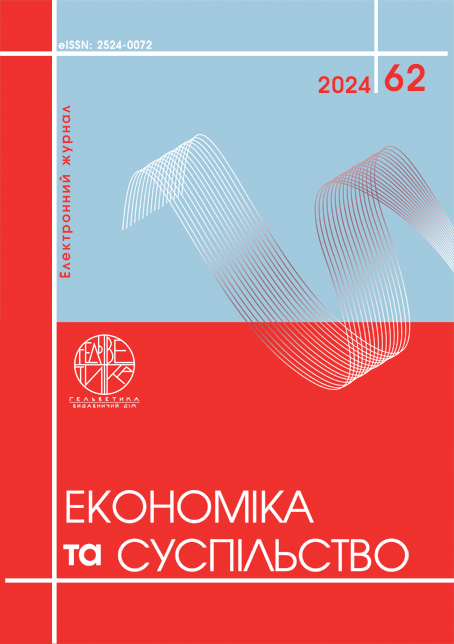HUMAN RESOURCES DEVELOPMENT IN THE CONTEXT OF ECONOMIC DIGITALIZATION
Abstract
The role of human resources development to ensure successful functioning of enterprises in the context of digitalization of the economy was studied in the article. The authors emphasize that the process of digitalization, which has covered all spheres of human activity, is radically changing the nature of economic relations and posing new challenges to enterprises. Human resources play a central role in the process of ensuring the efficiency of organizations, since the competence and readiness of personnel to adapt to digital transformations determine the competitiveness of enterprises in the digital economy. The authors emphasize the need to develop new skills and competencies necessary for effective work in the digital environment, such as mastery of digital tools, analytical skills, critical thinking, and adaptability. The article emphasises the need for continuous training and professional development of staff as a key condition for ensuring flexibility and adaptability of organisations. The authors propose to formulate a human resource management strategy taking into account the peculiarities of organisations' functioning in the digital environment and to adapt the organisational culture to digital transformations. The main strategies for staff development include the introduction of innovative approaches to training, creation of a favourable environment for continuous education, and the use of digital platforms and tools for human resource management. The article specifies digital solutions that will improve the efficiency of human resource management in organisations. The authors also emphasise the important role of senior management in organising and ensuring effective human resource development, which involves setting strategic priorities, planning staff development in line with the requirements of the digital environment, allocating resources and directing investments in staff development.
References
. Грішнова О. А., Копилов Д.В. Особливості залучення та утримання персоналу в умовах війни та діджиталізації праці. Теоретичні та прикладні питання економіки. Збірник наукових праць. К.: ТОВ «ЦП «КОМПРИНТ». 2023. . Випуск 2 (47). Грудень. С.35–48.
Семикіна М. В., Сікорака В. І., Сікорака І. О. Інноваційні зміни у змісті праці та зайнятості в умовах діджиталізації та руху в ЄС. Науковий вісник Льотної академії. Серія : Економіка, менеджмент та право. 2023. Вип. 8. С. 29–40.
Мельничук В.Е., Бояринова К.О. Цифровізація розвитку людського капіталу. Економічний вісник НТУУ «Київський політехнічний інститут». 2023. № 25. С. 21–25.
Мороз О. С. Людські ресурси в умовах цифровізації економіки. Приазовський економічний вісник. 2020. Випуск 6(23). С. 195–199.
Колот А.М., Герасименко О.О. Інститути зайнятості і доходів в новій економіці: глобальні тренди. Проблеми економіки та політичної економії. 2018. №1. С. 195–235.
Generative AI: How will it affect future jobs and workflows? McKinsey Global Institute. URL: https://www.mckinsey.com/mgi/our-research/generative-ai-how-will-it-affect-future-jobs-and-workflows (дата звернення: 15.04.2023).
Ринкевич Н.С. Організаційна культура підприємств: виклики, загрози та тенденції. Економічний вісник Донбасу. 2019. № 3 (57). С. 123-136.
AI tools as vanguard in a stagnant landscape. Redefining change management. Strategy &. Part of the PwC network. URL: https://www.strategyand.pwc.com/de/en/functions/organisational-strategy/redefining-change-management.html (дата звернення: 16.04.2023).
Hrishnova O. A., Kopylov D.V. (2023) Osoblyvosti zaluchennia ta utrymannia personalu v umovakh viiny ta didzhytalizatsii pratsi [Specific features of attracting and retaining staff in the context of war and digitalization of labour]. Teoretychni ta prykladni pytannia ekonomiky. Zbirnyk naukovykh prats. - Theoretical and applied issues of economics. Collection of scientific papers. vol. 2 (47). December. K.: TOV «TsP «KOMPRYNT. pp.35–48.
Semykina M. V., Sikoraka V. I., Sikoraka I. O. (2023) Innovatsiini zminy u zmisti pratsi ta zainiatosti v umovakh didzhytalizatsii ta rukhu v YeS [Innovative changes in the content of labour and employment in the context of digitalization and movement in the EU]. Naukovyi visnyk Lotnoi akademii. Seriia : Ekonomika, menedzhment ta pravo - Scientific Bulletin of the Flight Academy. Series: Economics, Management and Law. vol 8. pp. 29–40.
Melnychuk V.E., Boiarynova K.O. (2023) Tsyfrovizatsiia rozvytku liudskoho kapitalu [Digitalization of human capital development]. Ekonomichnyi visnyk NTUU «Kyivskyi politekhnichnyi instytut» - Economic Bulletin of NTUU "Kyiv Polytechnic Institute". vol 25. pp. 21–25.
Moroz O. S. (2020) Liudski resursy v umovakh tsyfrovizatsii ekonomiky [Human resources in the conditions of digitalisation of the economy]. Pryazovskyi ekonomichnyi visnyk - The Azov Economic Bulletin. vol 6(23). pp. 195–199.
Kolot A.M., Herasymenko O.O. (2018) Instytuty zainiatosti i dokhodiv v novii ekonomitsi: hlobalni trendy [Institutions of employment and income in the new economy: global trends.]. Problemy ekonomiky ta politychnoi ekonomii – Problems of economics and political economy. vol 1. pp. 195–235.
Generative AI: How will it affect future jobs and workflows? McKinsey Global Institute. URL: https://www.mckinsey.com/mgi/our-research/generative-ai-how-will-it-affect-future-jobs-and-workflows
AI tools as vanguard in a stagnant landscape. Redefining change management. Strategy &. Part of the PwC network. Available at: https://www.strategyand.pwc.com/de/en/functions/organisational-strategy/redefining-change-management.html
Rynkevych N.S. (2019) Orhanizatsiina kultura pidpryiemstv: vyklyky, zahrozy ta tendentsii [Organizational culture of enterprises: challenges, threats and trends]. Ekonomichnyi visnyk Donbasu – Economic Bulletin of Donbas. vol 3 (57). pp. 123–136.

This work is licensed under a Creative Commons Attribution 4.0 International License.


